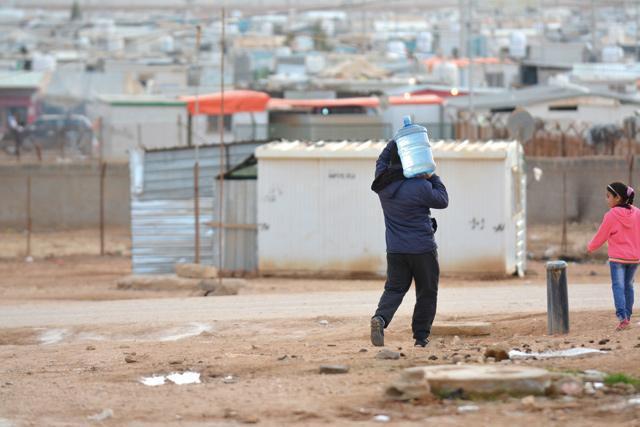You are here
Report highlights severe water stress in Jordan
By Batool Ghaith - Oct 19,2021 - Last updated at Oct 19,2021

A Syrian refugee carries water at Zaatari Syrian refugee camp, some 80km northeast of Amman, in this photo taken on January 28, 2018 (JT file photo)
AMMAN — Jordan is going through one of the most severe droughts in its history, according to the State of Food and Agriculture for 2020 report by the UN Food and Agriculture Organisation.
Jordan is the second most water scarce country in the world, as its annual renewable water resources are less than 100m3 per person, significantly below the threshold of 500m3 per person, which defines severe water scarcity, according to UNICEF.
The State of Food and Agriculture report for 2020 shows that more than 2,000 citizens in the Kingdom live in areas with a high incidence of drought in rainfed agricultural lands, pastures, or in irrigated areas that suffer from severe water stress, as a result of the effects of climate change.
The report stated that persistent and severe drought, exacerbated by climate change, is causing serious and increasing water shortages for rain-fed agriculture. This poses an even greater threat to the livelihoods of rural people by reducing crop and livestock yields.
Head of the Jordan Farmers Union Adnan Khaddam said that the Kingdom witnessed “one of the worst rainy seasons” in the last two years.
“The amount of rain was less than half its average, therefore, the dams had a shortage of water, which was paid for by farmers, especially citrus farmers,” Khaddam told The Jordan Times over the phone.
He also noted that summer crops are highly affected due to the drought, as small-scale farmers depend on them.
Khaddam called for building more dams in some areas in the Kingdom and the expansion of existing ones as well.
“Existing dams need renovation and more care, to help prevent the waste of water that occurs annually due to floods,” Khaddam continued.
The farmer’s union president urged the government to work on an urgent emergency plan to confront the problem in cooperation with the Ministry of Agriculture and the Ministry of Water and Irrigation.
Related Articles
War and drought have crippled Syria's wheat crop, with some experts now forecasting output of the staple food could fall to around a third of pre-war levels, and possibly even below one million tonnes for the first time in 40 years.
AMMAN — Farmers will soon be compensated for their losses caused by the wildfires that engulfed the Jordan Valley last summer. Ministry
AMMAN — Over 20 million cubic metres (mcm) of water entered the country’s 12 main dams after the rain, which lasted between Friday and Satur















